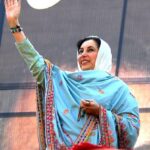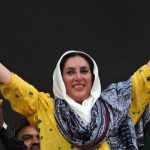Benazir Bhutto was born in 1953 in Karachi, Pakistan to Zulfikar Ali Bhutto and Begum Nusrat Ispahani, the eldest of the four siblings. As a young girl, she was exposed to political ideas and policies by her father, the former Prime Minister of Pakistan, and would one day follow in his footsteps. She completed her early education in Pakistan, and attended Radcliffe College, and graduated cum laude from Harvard University in 1973 with a Bachelor’s degree in comparative government. She received another undergraduate degree in philosophy, politics and economics from Lady Margaret Hall, Oxford, United Kingdom in 1977. During her time there, she became the first Asian woman to be elected the President of Oxford Union.
In 1982, three years after a military coup and her father’s execution, 29-year-old Bhutto became the chairperson of the Pakistan People’s Party (PPP), making her the first woman in Pakistan to head a major political party. In 1988, she became the first woman to be elected as the head of an Islamic state’s government; she also remains Pakistan’s only female prime minister. Noted for her charismatic authority and political astuteness, Bhutto drove initiatives for Pakistan’s economy and national security, and she implemented capitalist policies for industrial development and growth. In addition, her political philosophy and economic policies emphasized deregulation (particularly of the financial sector), flexible labor markets, the denationalization of state-owned corporations, and the withdrawal of subsidies to others. Bhutto’s popularity waned amid recession, corruption, and high unemployment which later led to the dismissal of her government by conservative President Ghulam Ishaq Khan
In 1993, Bhutto was elected for a second term after the parliamentary elections; she survived an attempted coup d’état in 1995. Her hard line against the trade unions and tough rhetorical opposition to her domestic political rivals and to neighboring India earned her the nickname “Iron Lady.” (She was also respectfully referred to as “BB.”) In 1996, charges of alleged corruption were levelled against her, which led to the final dismissal of her government by President Farooq Leghari. Bhutto conceded her defeat in the 1997 Parliamentary elections and went into exile in Dubai in 1999. Nine years later, in 2007, she returned to Pakistan, having reached an understanding with President General Pervez Musharraf, who granted her amnesty and withdrew all corruption charges against her. Bhutto was assassinated in a bombing on 27 December 2007, after leaving the PPP’s last rally in Rawalpindi, two weeks before the scheduled 2008 general election in which she was the leading candidate. Her party subsequently won the elections on a wave of sympathy generated by her assassination.

